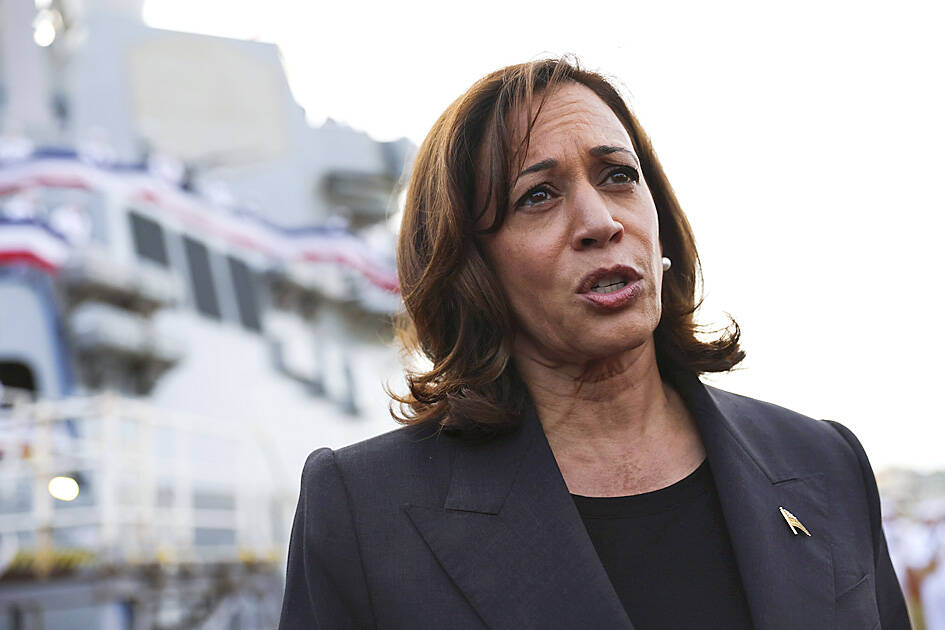Armed with a new law that boosts support for computer chip manufacturing, US Vice President Kamala Harris yesterday was seeking new investments and partnerships as she sat down with Japanese technology executives.
Harris was meeting with the chief executive officers on her last full day in Tokyo, a reflection of the US administration’s focus on boosting semiconductor manufacturing and expanding the supply chain for critical materials.
With China investing in computer chips of its own, the US is working to solidify its technology relationships with Taiwan, Japan and South Korea.

Photo: AP
Legislation signed by US President Joe Biden — known as the CHIPS and Science Act — includes US$52 billion for grants and incentives for semiconductor companies, plus a 25 percent tax credit when they invest in facilities in the US.
There is also about US$200 billion over the next decade to support research programs.
“There’s no one country or company that can do everything on its own,” said Jimmy Goodrich, vice president for global policy at the Semiconductor Industry Association.
When it comes to Japan, “there’s a big opportunity and significant space for future investment,” Goodrich said.
The companies participating in the meeting with Harris included Tokyo Electron, Nikon, Hitachi High Tech Group, Fujitsu Limited, Micron and others.
When Biden was in Japan earlier this year, the two nations agreed to work together on computer chips, including through a joint group focused on developing more powerful technologies.
There are worries that if Japan is slow to act, the fruits of the Biden initiative might be snatched up by South Korea.
Japanese Minister of Economy, Trade and Industry Yasutoshi Nishimura has repeatedly said that the alliance on semiconductors is a vital cog in US-Japan ties.
In meetings with US Secretary of Commerce Gina Raimondo and US Ambassador to Japan Rahm Emanuel, Nishimura has promised to set up a facility for semiconductor chips research in Japan this year, and expand the partnership on semiconductors with other allies, including Taiwan and Europe.
Atsushi Sunami, who teaches at the National Graduate Institute for Policy Studies in Tokyo, said that the drawbacks to Japan tackling advanced semiconductor technology might be rooted in the view that Japan should not get involved in defense studies.
Quick rethinking was in order and the moves by Washington could be an opportunity for Japan, Sunami said.
“As the US-China hegemonic competition escalates, how Japan hopes to position itself in the jockeying for international standards and rulemaking, and the strategic formation of alliances among nations, as well as among companies, will be critically meaningful,” he said in a report earlier this year.

TRAGEDY STRIKES TAIPEI: The suspect died after falling off a building after he threw smoke grenades into Taipei Main Station and went on a killing spree in Zhongshan A 27-year-old suspect allegedly threw smoke grenades in Taipei Main Station and then proceeded to Zhongshan MRT Station in a random killing spree that resulted in the death of the suspect and two other civilians, and seven injured, including one in critical condition, as of press time last night. The suspect, identified as a man surnamed Chang Wen (張文), allegedly began the attack at Taipei Main Station, the Taipei Fire Department said, adding that it received a report at 5:24pm that smoke grenades had been thrown in the station. One man in his 50s was rushed to hospital after a cardiac arrest

SAFETY FIRST: Double the number of police were deployed at the Taipei Marathon, while other cities released plans to bolster public event safety Authorities across Taiwan have stepped up security measures ahead of Christmas and New Year events, following a knife and smoke bomb attack in Taipei on Friday that left four people dead and 11 injured. In a bid to prevent potential copycat incidents, police deployments have been expanded for large gatherings, transport hubs, and other crowded public spaces, according to official statements from police and city authorities. Taipei Mayor Chiang Wan-an (蔣萬安) said the city has “comprehensively raised security readiness” in crowded areas, increased police deployments with armed officers, and intensified patrols during weekends and nighttime hours. For large-scale events, security checkpoints and explosives

A car bomb killed a senior Russian general in southern Moscow yesterday morning, the latest high-profile army figure to be blown up in a blast that came just hours after Russian and Ukrainian delegates held separate talks in Miami on a plan to end the war. Kyiv has not commented on the incident, but Russian investigators said they were probing whether the blast was “linked” to “Ukrainian special forces.” The attack was similar to other assassinations of generals and pro-war figures that have either been claimed, or are widely believed to have been orchestrated, by Ukraine. Russian Lieutenant General Fanil Sarvarov, 56, head

PUBLIC SAFETY: The premier said that security would be tightened in transport hubs, while President Lai commended the public for their bravery The government is to deploy more police, including rapid response units, in crowded public areas to ensure a swift response to any threats, President William Lai (賴清德) said yesterday after a knife attack killed three people and injured 11 in Taipei the previous day. Lai made the remarks following a briefing by the National Police Agency on the progress of the investigation, saying that the attack underscored the importance of cooperation in public security between the central and local governments. The attack unfolded in the early evening on Friday around Taipei Main Station’s M7 exit and later near the Taipei MRT’s Zhongshan